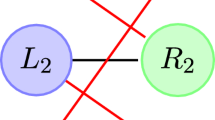Abstract
We consider the following item pricing problem which has received much attention recently. A seller has an infinite numbers of copies of n items. There are m buyers, each with a budget and an intention to buy a fixed subset of items. Given prices on the items, each buyer buys his subset of items, at the given prices, provided the total price of the subset is at most his budget. The objective of the seller is to determine the prices such that her total profit is maximized.
In this paper, we focus on the case where the buyers are interested in subsets of size at most two. This special case is known to be APX-hard (Guruswami et al [1]). The best known approximation algorithm, by Balcan and Blum, gives a 4-approximation [2]. We show that there is indeed a gap of 4 for the combinatorial upper bound used in their analysis. We further show that a natural linear programming relaxation of this problem has an integrality gap of 4, even in this special case. Then we prove that the problem is NP-hard to approximate within a factor of 2 assuming the Unique Games Conjecture; and it is unconditionally NP-hard to approximate within a factor 17/16. Finally, we extend the APX-hardness of the problem to the special case in which the graph formed by items as vertices and buyers as edges is bipartite.
We hope that our techniques will be helpful for obtaining stronger hardness of approximation bounds for this problem.
Preview
Unable to display preview. Download preview PDF.
Similar content being viewed by others
References
Guruswami, V., Hartline, J., Karlin, A., Kempe, D., Kenyon, C., McSherry, F.: On profit-maximizing envy-free pricing. In: Proceedings, ACM-SIAM Symposium on Discrete Algorithms, pp. 1164–1173 (2005)
Balcan, M.-F., Blum, A.: Approximation algorithms and online mechanisms for item pricing. Theory of Computing 3, 179–195 (2007)
Goldberg, A., Hartline, J., Karlin, A., Saks, M., Wright, A.: Competitive auctions. Games and Economic Behavior 55, 242–269 (2006)
Demaine, E.D., Feige, U., Hajiaghayi, M., Salavatipour, M.R.: Combination can be hard: Approximability of the unique coverage problem. In: Proceedings, ACM-SIAM Symposium on Discrete Algorithms, pp. 162–171 (2006)
Briest, P., Krysta, P.: Single-minded unlimited supply pricing on sparse instances. In: Proceedings, ACM-SIAM Symposium on Discrete Algorithms, pp. 1093–1102 (2006)
Krauthgamer, R., Mehta, A., Rudra, A.: Pricing commodities, or how to sell when buyers have restricted valuations. In: Proceedings, Workshop on Approximation and Online Algorithms (2007)
Elbassioni, K., Sitters, R., Zhang, Y.: A quasi-ptas for profit-maximizing pricing on line graphs. In: Proceedings, European Symposium on Algorithms, pp. 451–462 (2007)
Hartline, J., Koltun, V.: Near-optimal pricing in near-linear time. In: Proceedings, Workshop on Algorithms and Data Structures, pp. 422–431 (2005)
Guruswami, V., Manokaran, R., Raghavendra, P.: Beating the random ordering is hard: Inapproximability of maximum acyclic subgraph. In: FOCS, pp. 573–582 (2008)
Håstad, J.: Some optimal inapproximability results. J. ACM 48, 798–859 (2001)
Alon, N., Bollobàs, B., Gyàrfàs, L.A.J., Scott, A.: Maximum directed cuts in acyclic digraphs. J. Graph Theory 55, 1–13 (2007)
Raghavendra, P.: Optimal algorithms and inapproximability results for every csp? In: STOC, pp. 245–254 (2008)
Author information
Authors and Affiliations
Editor information
Editors and Affiliations
Rights and permissions
Copyright information
© 2009 Springer-Verlag Berlin Heidelberg
About this paper
Cite this paper
Khandekar, R., Kimbrel, T., Makarychev, K., Sviridenko, M. (2009). On Hardness of Pricing Items for Single-Minded Bidders. In: Dinur, I., Jansen, K., Naor, J., Rolim, J. (eds) Approximation, Randomization, and Combinatorial Optimization. Algorithms and Techniques. APPROX RANDOM 2009 2009. Lecture Notes in Computer Science, vol 5687. Springer, Berlin, Heidelberg. https://doi.org/10.1007/978-3-642-03685-9_16
Download citation
DOI: https://doi.org/10.1007/978-3-642-03685-9_16
Publisher Name: Springer, Berlin, Heidelberg
Print ISBN: 978-3-642-03684-2
Online ISBN: 978-3-642-03685-9
eBook Packages: Computer ScienceComputer Science (R0)




